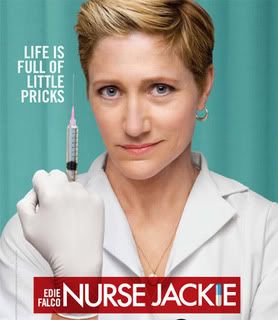TV REVIEW: Nurses Ratchet Up the Medical Show Ladder
Jun2
Suddenly, in the world of TV medicine, RN are the letters you want after your name. Two summer cable shows garnering considerable buzz, SHOWTIME’s Nurse Jackie and TNT’s HawthoRNe, shine the spotlight on nurses, the hospital heroes often relegated into the shadows of doctors on prime time. ScriptPhD.com got a sneak peak of the HawthoRNe pilot and the first half of the Nurse Jackie season.
Nurse Jackie (SHOWTIME)
ScriptPhD Grade: A

"This job is wading through a sh*tstorm of people who come in here on the worst day of their lives. Doctors are here to diagnose, not heal. We heal." Nurse Jackie photo © SHOWTIME and Lionsgate.
I didn’t want to love Nurse Jackie, I just want to say that for the record. First of all, she’s been taunting me on the billboards of Los Angeles all spring and summer long with that intimidating needle. Secondly, I didn’t know if I had it in me to get attached to yet another medical show. Third, after hooking me with brilliant shows like Dexter, Weeds and newcomer The United States of Tara, could SHOWTIME extend their magic touch to this newest addition to their franchise? They could, they did, and the result is some of the freshest television this side of basic cable. Starring three-time Emmy®-winner Edie Falco, Nurse Jackie is based on the provocative tell-all journal of a real-life Manhattan nurse. Shot on location in New York City, the show spares nothing in projecting the goings-on of a big-city ER through the eyes of one very unorthodox nurse.
And Jackie Peyton is certainly not an easy character to love. She’s decidedly cantankerous and has little time for people or their stupidities. “I don’t do chatty,” she barks. “I like quiet. Quiet and mean. Those are my people.” She’s got an unhealthy attachment to painkillers. No matter the delivery system (mouth, nose, coffee) or the type (Adderall, Vicodin, OxyContin, Percocet), Jackie’s not very picky. She views rules as bendable at best, nonexistent at worst. Oh yeah, and then there’s the part where she’s cheating on her husband. But there’s two sides to every coin, and Jackie is no exception. At home, he’s a devoted wife and mother. Her picture-perfect husband Kevin (Dominic Fumusa) struggles between tending to their daughters Grace, sporting an escalating emotional anxiety disorder, and Fiona (Ruby Jerins and Daisy Tahan) and running his bar. At the ironically named All-Saints Hospital, she’s an extraordinary, deeply empathetic nurse. Whether she’s helping a 10-year-old take care of her mom with some contraband pharmacy supplies, assisting a terminally ill fellow nurse, helping a mute stroke victim shut up his obnoxious family or stealing money from a criminal to help a dead patient’s poor fiance, Jackie weaves through the murky moral grey area to ultimately do what’s right for her patients. Part saint, part sinner, Nurse Jackie is never less than totally compelling.
Trailing Jackie’s every move (much to her dismay) is overly earnest, perky nursing student Zoey Barkow (Merritt Weaver). Luckily, Jackie can take reprieve from her besotted young acolyte and her problems with the rest of her hospital family. Providing cover is her partner in crime, fellow nurse Mohammed “Mo-Mo” de la Cruz (Haaz Sleiman), with whom she bends the rules, shares coffee breaks and romantic advice. Providing narcotics and lunchtime quickies is pharmacist Eddie Walzer (Paul Schulze). Her best friend and confidante is the wry Brit Dr. Eleanor O’Hara (a razor-sharp Eve Best). She has a penchant for expensive clothes, snappy comebacks and mid-town lunchcapades with “Jacks”, but seems to be holding back a painful past. Peter Facinelli (Damages) is the handsome, young Dr. Fitch “Coop” Cooper, who could easily be dismissed as a one-dimensional, book smart but inept playboy. But with lesbian moms (the devine Blythe Danner and Swoozie Kurtz), a proclivity for Tourette’s-like inappropriate touching, and better doctor skills than he gives himself credit for, Coop is more than meets the eye. Rounding out the ensemle is rote ER administrator Gloria Akalitus (The West Wing’s Anna Deveare Smith), who rules with an iron fist, thinking she’s hip to every trick in the book. (By the way, who knew Deveare Smith had such a gift for physical comedy? Two gags with a Taser and some wayward painkillers had me rolling on the floor.)
Employing top-notch writing and directing, led by creative team Evan Dunsky, Liz Brixius and Linda Wallem, Nurse Jackie shies away from tired old medical show tropes to peel back the layers of a functional addict leading compartmentalized lives, to realistically show the challenges nurses face in saving lives under the limitations of our broken medical system, and to ask, “What does it really mean to be good?” Nurse Jackie may be addicted to bad behavior and every painkiller on the planet, but in the end, I’m addicted to her. I wouldn’t have it any other way.
Nurse Jackie airs on SHOWTIME Mondays at 10:30 EST/PT, following Weeds.
HawthoRNe (TNT)
ScriptPhD Grade: B

The cast of HawthoRNe. Image © Turner Broadcasting, 2009.
A number of high-profile film actors have recently settled comfortably in starring TV roles, most successfully Emmy® winners Glenn Close (Damages) and Alec Baldwin (30 Rock). TNT, with their long and storied tradition of strong female drama leads, from Kyra Sedgwick’s The Closer to Holly Hunter’s Saving Grace, extends the same small-screen opportunity to Jada Pinkett Smith, who stars in new medical drama HawthoRNe. Lest there be any doubt about the girl power behind this series, it is being co-produced by Pinkett Smith’s 100% Womon [sic] Productions. In the first five minutes alone, Christina Hawthorne races to Richmond Trinity Hospital in the middle of the night, out(wo)mans an armed security guard, tends to a wandering psych ward patient, pays care to a homeless woman she’s befriended and talks down a suicidal cancer patient. But it turns out, there are some cracks in Christina’s impenetrable armor. For one, the pilot takes place on the one-year anniversary of the death of her husband, whose ashes she still talks to. To celebrate, her rebellious, headstrong daughter Camille (Hannah Hodson) chains herself to the school’s vending machine, much to her mother’s consternation. And a deliciously saccharine Joanna Cassidy is the still-meddling mother-in-law who also serves on Trinity’s board.
As the hospitals Chief Nursing Officer, Christina is organized, uncompromising, decisive, empathetic, and always puts the needs of patients first. Her charges include nurse Bobbie Jackson (Suleka Matthew), one of her best friends and nurse Ray Stein (David Julian Hirsh), a man caught in a woman’s world. Alias’s Michael Vartan (welcome back to television Mr. Vaughn!) is Dr. Tom Wakefield, the Chief of Surgery with whom Christina often butts heads administratively, but who also treated her late husband for cancer.
Still working out its kinks, HawthoRNe feels a bit uneven at times, mostly due to relying on some trite, atavistic medical formulas that come off stale. A genuinely compelling storyline about a homeless woman besieged with mental problems giving birth outside the hospital is negated by an unnecessary (and gross!) side plot involving a grateful nurse (Christina Moore)…um…thanking a wounded soldier for his service. Her name is Candy. Seriously. And a chance to explore doctor-nurse synergy and conflict in providing effective patient care turns downright silly when the characters in question ride two extremes: the stupendously arrogant, omniscient doctor whose decisions Cannot. Be. Questioned. and the equally timorous nurse who dare not think independently. And don’t forget to save some snickers, because he’s a male nurse, which is funny, or was in 1975.
TNT may know drama, but HawthoRNe needs to tone it down a bit. To be fair, having only viewed the pilot, the show has definite potential to grow. With the departure of ER, no current medical show centerpieces medicine in a cash-strapped, blue-collar city hospital. Set in Richmond, VA, HawthoRNe has a unique opportunity to tell stories pertaining to the challenges of its setting and patient population. It also is clearly a character-driven drama, establishing some fascinating early relationships. The tension between Christina and her bitchy mother-in-law, tempered by working through the shared grief with her still-angry daughter, makes for a rather interesting family triangle. And sparks fly between Pinkett Smith and Vartan, who is obviously being set up as a potential love interest. But the biggest asset is Pinket Smith herself. She brings an intensity, compassion and resolve to a complex character. Her movie star power translates well to the small screen, and could easily make HawthoRNe a fine vehicle for her considerable acting chops. Assuming they steer clear of Clicheland.
HawthoRNe premieres this Tuesday, June 16th on TNT at 9 EST/PT.
This sudden focus on the nursing profession doesn’t come a minute too soon. According to the American Association of Colleges of Nursing, the United States is in the midst of an imminent nursing shortage, compounded by the rapidly aging baby boomer population and low enrollment in nursing programs that is not expected to meet this demand. As of July, 2007, total RN vacancies across the US totaled 135,000, or 8.1%, according to a report released by the American Hospital Association. Projections from the U.S. Bureau of Labor Statistics published in the November 2007 Monthly Labor Review foresee that more than one million new and replacement nurses will be needed by 2016. Contributing factors vary, from a shortage of nursing school faculty and projected enrollments, to a slowing rate of growth for the overall nursing population, resulting in a climbing average age of the nursing population. The result for nurses? Insufficient staffing is raising their stress levels, impacting job satisfaction, and driving many nurses to leave the profession. The result for patients? Inadequate access to quality health care. An eye-opening report released in August 2002 by the Joint Commission on Accreditation of Healthcare Organizations, revealed that a shortage of nurses in America’s hospitals is putting patient lives in danger. JCAHO examined 1609 hospital reports of patient deaths and injuries since 1996 and found that low nursing staff levels were a contributing factor in 24% of the cases.
Less than a month ago, members of major nursing unions that included the California Nurses Association/National Nurses Organizing Committee, the United American Nurses (UAN), and the Massachusetts Nurses Association, congregated on Capitol Hill as part of a National RN Day of Action in Washington, D.C., that included a conference focused on promoting legislation that would guarantee certain ratios of nurses to patients nationally, a march and rally, and visits to their congressional representatives to advocate on various legislative issues. The legislation, House Resolution 2273, also seeks to protect the rights of nurses to advocate on behalf of their patients, and to invest in training new nurses to address the current nationwide nursing shortage.
To discuss some of these issues, and to get a dose of real-life perspective on the profession, ScriptPhD.com sat down with Dr. Suzette Cardin, Assistant Dean of Student Affairs at UCLA’s venerable School of Nursing, ranked in the top ten of national nursing programs. Dr. Cardin has over 35 years of experience in nursing, and prior to her faculty appointment, she spent 14 years as Unit Director of the Critical Care Unit and the Cardiac Observation Unit at the UCLA Medical Center. She has been honored as a Fellow of the American Academy of Nursing and the American Heart Association. To read our interview, please click “continue reading”.
